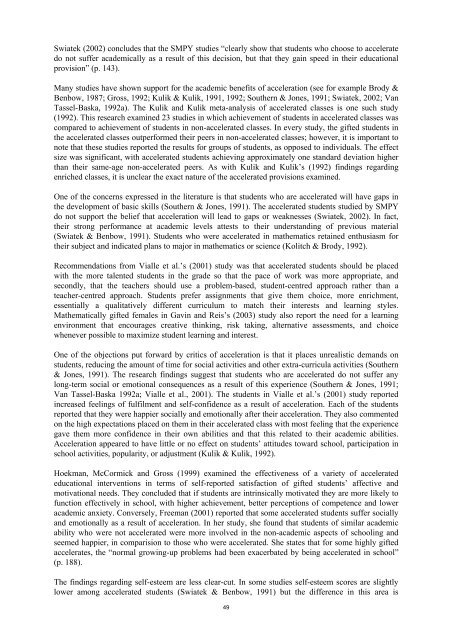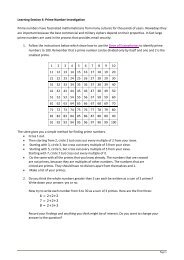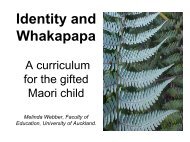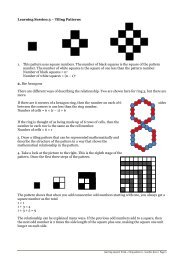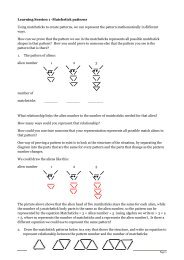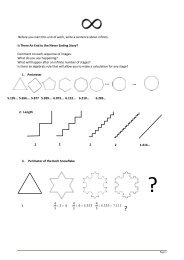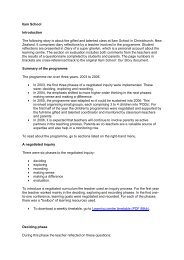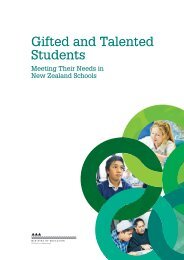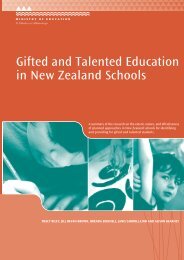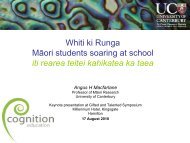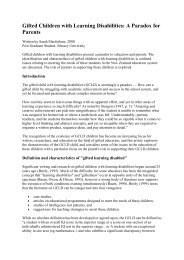The Extent, Nature and Effectiveness of Planned Approaches in ...
The Extent, Nature and Effectiveness of Planned Approaches in ...
The Extent, Nature and Effectiveness of Planned Approaches in ...
Create successful ePaper yourself
Turn your PDF publications into a flip-book with our unique Google optimized e-Paper software.
Swiatek (2002) concludes that the SMPY studies “clearly show that students who choose to acceleratedo not suffer academically as a result <strong>of</strong> this decision, but that they ga<strong>in</strong> speed <strong>in</strong> their educationalprovision” (p. 143).Many studies have shown support for the academic benefits <strong>of</strong> acceleration (see for example Brody &Benbow, 1987; Gross, 1992; Kulik & Kulik, 1991, 1992; Southern & Jones, 1991; Swiatek, 2002; VanTassel-Baska, 1992a). <strong>The</strong> Kulik <strong>and</strong> Kulik meta-analysis <strong>of</strong> accelerated classes is one such study(1992). This research exam<strong>in</strong>ed 23 studies <strong>in</strong> which achievement <strong>of</strong> students <strong>in</strong> accelerated classes wascompared to achievement <strong>of</strong> students <strong>in</strong> non-accelerated classes. In every study, the gifted students <strong>in</strong>the accelerated classes outperformed their peers <strong>in</strong> non-accelerated classes; however, it is important tonote that these studies reported the results for groups <strong>of</strong> students, as opposed to <strong>in</strong>dividuals. <strong>The</strong> effectsize was significant, with accelerated students achiev<strong>in</strong>g approximately one st<strong>and</strong>ard deviation higherthan their same-age non-accelerated peers. As with Kulik <strong>and</strong> Kulik’s (1992) f<strong>in</strong>d<strong>in</strong>gs regard<strong>in</strong>genriched classes, it is unclear the exact nature <strong>of</strong> the accelerated provisions exam<strong>in</strong>ed.One <strong>of</strong> the concerns expressed <strong>in</strong> the literature is that students who are accelerated will have gaps <strong>in</strong>the development <strong>of</strong> basic skills (Southern & Jones, 1991). <strong>The</strong> accelerated students studied by SMPYdo not support the belief that acceleration will lead to gaps or weaknesses (Swiatek, 2002). In fact,their strong performance at academic levels attests to their underst<strong>and</strong><strong>in</strong>g <strong>of</strong> previous material(Swiatek & Benbow, 1991). Students who were accelerated <strong>in</strong> mathematics reta<strong>in</strong>ed enthusiasm fortheir subject <strong>and</strong> <strong>in</strong>dicated plans to major <strong>in</strong> mathematics or science (Kolitch & Brody, 1992).Recommendations from Vialle et al.’s (2001) study was that accelerated students should be placedwith the more talented students <strong>in</strong> the grade so that the pace <strong>of</strong> work was more appropriate, <strong>and</strong>secondly, that the teachers should use a problem-based, student-centred approach rather than ateacher-centred approach. Students prefer assignments that give them choice, more enrichment,essentially a qualitatively different curriculum to match their <strong>in</strong>terests <strong>and</strong> learn<strong>in</strong>g styles.Mathematically gifted females <strong>in</strong> Gav<strong>in</strong> <strong>and</strong> Reis’s (2003) study also report the need for a learn<strong>in</strong>genvironment that encourages creative th<strong>in</strong>k<strong>in</strong>g, risk tak<strong>in</strong>g, alternative assessments, <strong>and</strong> choicewhenever possible to maximize student learn<strong>in</strong>g <strong>and</strong> <strong>in</strong>terest.One <strong>of</strong> the objections put forward by critics <strong>of</strong> acceleration is that it places unrealistic dem<strong>and</strong>s onstudents, reduc<strong>in</strong>g the amount <strong>of</strong> time for social activities <strong>and</strong> other extra-curricula activities (Southern& Jones, 1991). <strong>The</strong> research f<strong>in</strong>d<strong>in</strong>gs suggest that students who are accelerated do not suffer anylong-term social or emotional consequences as a result <strong>of</strong> this experience (Southern & Jones, 1991;Van Tassel-Baska 1992a; Vialle et al., 2001). <strong>The</strong> students <strong>in</strong> Vialle et al.’s (2001) study reported<strong>in</strong>creased feel<strong>in</strong>gs <strong>of</strong> fulfilment <strong>and</strong> self-confidence as a result <strong>of</strong> acceleration. Each <strong>of</strong> the studentsreported that they were happier socially <strong>and</strong> emotionally after their acceleration. <strong>The</strong>y also commentedon the high expectations placed on them <strong>in</strong> their accelerated class with most feel<strong>in</strong>g that the experiencegave them more confidence <strong>in</strong> their own abilities <strong>and</strong> that this related to their academic abilities.Acceleration appeared to have little or no effect on students’ attitudes toward school, participation <strong>in</strong>school activities, popularity, or adjustment (Kulik & Kulik, 1992).Hoekman, McCormick <strong>and</strong> Gross (1999) exam<strong>in</strong>ed the effectiveness <strong>of</strong> a variety <strong>of</strong> acceleratededucational <strong>in</strong>terventions <strong>in</strong> terms <strong>of</strong> self-reported satisfaction <strong>of</strong> gifted students’ affective <strong>and</strong>motivational needs. <strong>The</strong>y concluded that if students are <strong>in</strong>tr<strong>in</strong>sically motivated they are more likely t<strong>of</strong>unction effectively <strong>in</strong> school, with higher achievement, better perceptions <strong>of</strong> competence <strong>and</strong> loweracademic anxiety. Conversely, Freeman (2001) reported that some accelerated students suffer socially<strong>and</strong> emotionally as a result <strong>of</strong> acceleration. In her study, she found that students <strong>of</strong> similar academicability who were not accelerated were more <strong>in</strong>volved <strong>in</strong> the non-academic aspects <strong>of</strong> school<strong>in</strong>g <strong>and</strong>seemed happier, <strong>in</strong> comparision to those who were accelerated. She states that for some highly giftedaccelerates, the “normal grow<strong>in</strong>g-up problems had been exacerbated by be<strong>in</strong>g accelerated <strong>in</strong> school”(p. 188).<strong>The</strong> f<strong>in</strong>d<strong>in</strong>gs regard<strong>in</strong>g self-esteem are less clear-cut. In some studies self-esteem scores are slightlylower among accelerated students (Swiatek & Benbow, 1991) but the difference <strong>in</strong> this area is49


